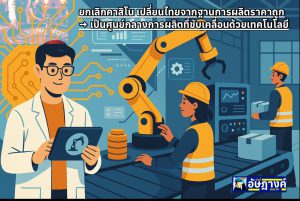
“แจกเงิน–เปิดบ่อน ไม่ใช่ทางรอดเศรษฐกิจไทย ยิ่งทำยิ่งหลงทาง พาไทยยิ่งถอยหลังลงเหว“
โดย อัษฎางค์ ยมนาค
จุดอ่อนเชิงโครงสร้างของเศรษฐกิจไทย และความจำเป็นเร่งด่วนในการปฏิรูปอย่างเป็นระบบ
บทนำ
แม้รัฐบาลไทยจะดำเนินนโยบายเศรษฐกิจที่มุ่งหวังกระตุ้นการบริโภค เช่น การแจกเงินดิจิทัล หรือแม้กระทั่งข้อเสนอการเปิดคาสิโนอย่างถูกกฎหมาย แต่นโยบายเหล่านี้ไม่สามารถแก้ไขปัญหาเศรษฐกิจของประเทศได้อย่างยั่งยืน เนื่องจากมิได้แตะถึงรากเหง้าของปัญหาที่แท้จริง
แม้จะมีข้ออ้างว่า “คาสิโนจะดึงดูดรายได้จากนักท่องเที่ยว” แต่ในสังคมที่ยังมีความเหลื่อมล้ำสูง การบังคับใช้กฎหมายไม่เข้มงวด และเจ้าหน้าที่รัฐยังตกเป็นเครื่องมือของกลุ่มทุน — การเปิดคาสิโนอาจทำให้ปัญหาที่มีอยู่รุนแรงขึ้น จนกลายเป็นบ่อนทำลายชาติในระยะยาว ซึ่งเท่ากับการเปิด “โรงงานผลิตปัญหา” โดยไม่ตั้งใจ
ทางรอดของประเทศไทยไม่ได้อยู่ที่การแจกเงินหรือเปิดคาสิโน สิ่งที่รัฐบาลควรทำคือการปฏิรูปอย่างเป็นระบบและยั่งยืน โดยมุ่งพัฒนาคน ยกระดับภาคการผลิต และสร้างความโปร่งใสในระบบราชการเพื่อวางรากฐานสู่อนาคตที่มั่นคงและเท่าเทียม
การแก้ไขปัญหาเศรษฐกิจต้องแก้ที่รากเหง้าของปัญหาที่แท้จริง ซึ่งได้แก่โครงสร้างเชิงลึกของระบบเศรษฐกิจและสังคมที่อ่อนแอ โดยสามารถแบ่งออกเป็นสามประเด็นหลัก ได้แก่ (1) โครงสร้างภาคการผลิตที่ล้าหลัง (2) โครงสร้างประชากรที่ไม่เอื้อต่อการพัฒนา และ (3) โครงสร้างสถาบันที่ขาดความเข้มแข็งและโปร่งใส ซึ่งล้วนเป็นปัจจัยต้นทางของความเหลื่อมล้ำและการเติบโตที่ไร้ประสิทธิภาพ การแก้ไขปัญหาเหล่านี้จึงจำเป็นต้องอาศัยการปฏิรูปรอบด้านอย่างเป็นระบบและต่อเนื่อง
1. โครงสร้างภาคการผลิตที่ล้าหลัง
เศรษฐกิจไทยยังพึ่งพาภาคเกษตรกรรมและอุตสาหกรรมการผลิตที่มีมูลค่าเพิ่มต่ำ โดยเฉพาะระบบ OEM (Original Equipment Manufacturing) ซึ่งเน้นการรับจ้างผลิตโดยไม่สามารถควบคุมแบรนด์หรือเทคโนโลยีหลักได้ ประกอบกับการลงทุนด้านวิจัยและพัฒนา (R&D) ที่อยู่ในระดับต่ำเพียงร้อยละ 1.14 ของ GDP (World Bank, 2022) ทำให้เศรษฐกิจไทยไม่สามารถสร้างนวัตกรรมที่แข่งขันได้ในเวทีโลก
แนวทางการปฏิรูป:
ประเทศไทยควรเร่งพัฒนาเศรษฐกิจฐานความรู้ (knowledge-based economy) ด้วยการส่งเสริมนวัตกรรม เทคโนโลยี และการพัฒนา AgriTech เพื่อลดต้นทุนภาคเกษตรและเพิ่มประสิทธิภาพการผลิต (NESDC, 2023)
2. โครงสร้างประชากรที่ไม่เอื้อต่อการพัฒนา
จากข้อมูลของสภาพัฒน์ฯ (NESDC, 2023) ประเทศไทยได้เข้าสู่สังคมผู้สูงวัยอย่างสมบูรณ์ (Aged Society) โดยมีสัดส่วนประชากรอายุ 60 ปีขึ้นไปมากกว่าร้อยละ 20 ของประชากรทั้งหมด ขณะเดียวกันแรงงานวัยทำงานกลับมีแนวโน้มลดลงอย่างต่อเนื่อง และแรงงานรุ่นใหม่จำนวนมากขาดทักษะสำคัญในศตวรรษที่ 21 เช่น ความสามารถในการคิดเชิงวิพากษ์ การทำงานร่วมกัน และทักษะด้านดิจิทัล
แนวทางการปฏิรูป:
การปฏิรูปการศึกษาควรเน้นการเรียนรู้ตลอดชีวิต (lifelong learning) การส่งเสริมทักษะใหม่ (reskilling) และทักษะดิจิทัล (digital literacy) ควบคู่กับการเปิดรับแรงงานฝีมือจากต่างชาติอย่างมีระบบ เพื่อบรรเทาการขาดแคลนแรงงานในภาคอุตสาหกรรมที่มีศักยภาพ
3. โครงสร้างสถาบันที่อ่อนแอและการคอร์รัปชันเชิงระบบ
หนึ่งในอุปสรรคหลักของการพัฒนาอย่างยั่งยืน คือ การที่สถาบันของรัฐขาดความโปร่งใสและประสิทธิภาพ โดยเฉพาะการบังคับใช้กฎหมายที่ไม่เสมอภาค การผูกขาดทางเศรษฐกิจ และการคอร์รัปชันเชิงระบบ ซึ่งส่งผลให้ประชาชนขาดความเชื่อมั่นในภาครัฐ และการลงทุนจากต่างประเทศชะลอตัว (Transparency International, 2023)
แนวทางการปฏิรูป:
ประเทศไทยควรส่งเสริมการบริหารภาครัฐที่โปร่งใสผ่านระบบ open government data, ใช้เทคโนโลยีดิจิทัลในการลดขั้นตอนราชการ และเปิดให้ประชาชนมีส่วนร่วมในการติดตามและประเมินนโยบายภาครัฐ (OECD, 2022)
บทสรุป
ปัญหาเศรษฐกิจของไทยในปัจจุบันมิได้เป็นเพียงผลกระทบจากสถานการณ์โลกหรือวิกฤตชั่วคราว หากแต่เกิดจากโครงสร้างเศรษฐกิจ สังคม และสถาบันที่บกพร่อง การดำเนินนโยบายที่เน้นผลในระยะสั้นไม่สามารถสร้างความเปลี่ยนแปลงที่แท้จริงได้ ประเทศไทยจำเป็นต้องปฏิรูปอย่างเป็นระบบและยั่งยืน โดยมุ่งพัฒนาคน ยกระดับภาคการผลิต และสร้างความโปร่งใสในระบบราชการเพื่อวางรากฐานสู่อนาคตที่มั่นคงและเท่าเทียม
“Cash Handouts and Casinos Won’t Save Thailand — They’re Leading the Economy Further into Decline”
Thailand’s Structural Weaknesses and the Urgent Need for Comprehensive Reform
By Eddie Atsadāng Yommanāk
Introduction
The Thai government has implemented various economic policies aimed at stimulating domestic consumption, such as digital cash handouts and even controversial proposals to legalize casinos. However, these measures fail to address the fundamental roots of Thailand’s economic problems and therefore cannot offer sustainable solutions.
While proponents argue that legal casinos could generate revenue through tourism, in a society marked by deep inequality, weak law enforcement, and state institutions susceptible to capture by vested interests, such initiatives risk exacerbating existing problems. In such a context, legalizing casinos could ultimately become a “factory of problems,” inadvertently fueling corruption, crime, and social division in the long term.
Thailand’s economic salvation does not lie in short-term populist schemes like cash giveaways or gambling legalization. Rather, the government must pursue comprehensive, structural reforms that focus on human capital development, modernization of the production sector, and institutional transparency to build a stable and equitable future.
Addressing Thailand’s economic challenges requires tackling the root causes embedded in the structural weaknesses of its economic and social systems. These can be categorized into three major dimensions: (1) a backward production structure, (2) an unfavorable demographic and human capital base, and (3) weak institutional frameworks characterized by poor governance and corruption. These structural issues are at the core of Thailand’s persistent inequality and economic inefficiency, and resolving them will require sustained and systemic reform efforts.
1. Outdated Production Structure
Thailand’s economy remains heavily reliant on low-value-added sectors such as traditional agriculture and basic manufacturing. Much of its industrial output is driven by Original Equipment Manufacturing (OEM), which offers limited innovation or branding power. The lack of technological investment and minimal expenditure on research and development (R&D) stifles productivity growth and hinders the transition to a knowledge-based economy.
Policy Recommendation:
To address this, Thailand must shift toward a high-value production model by incentivizing innovation, supporting deep-tech startups, and facilitating public-private partnerships in R&D. Furthermore, modernizing the agricultural sector with AgriTech solutions and digitized logistics systems can boost productivity and reduce income disparities between urban and rural areas.
2. Demographic and Human Capital Challenges
Thailand is entering an aging society with a shrinking working-age population. Simultaneously, the younger generation often lacks the necessary skills to compete in a rapidly changing global economy shaped by digitalization and automation. The education system continues to emphasize rote learning rather than fostering creativity, problem-solving, or entrepreneurial thinking.
Policy Recommendation:
Long-term investment in human capital is vital. Educational reform must focus on STEM fields, soft skills, and flexible learning paths. Promoting lifelong learning through accessible online platforms and vocational training can also bridge the skills gap. In addition, Thailand should consider welcoming skilled foreign workers under regulated frameworks to supplement its domestic labor shortages.
3. Weak Institutions and Endemic Corruption
A major barrier to inclusive development is institutional dysfunction. Corruption, opaque governance, and selective law enforcement erode public trust and discourage investment. Monopoly power across key sectors further concentrates wealth and limits fair competition.
Policy Recommendation:
Thailand must strengthen institutional integrity through transparency initiatives, such as open data policies and digital governance platforms. Anti-corruption frameworks must be empowered with independence and enforcement capacity. Moreover, public participation in budgetary oversight and regulatory processes can enhance accountability and legitimacy.
Conclusion
Thailand’s current economic approach—centered on short-term stimulation and politically expedient measures—fails to address the deeper structural issues that underlie its economic vulnerabilities. To ensure long-term prosperity and social cohesion, the country must embark on a path of comprehensive structural reform. By modernizing its production base, investing in human capital, and restoring institutional credibility, Thailand can break free from the middle-income trap and build a more inclusive and resilient economy for future generations.



